How Rap Became The Soundtrack Of The 1%
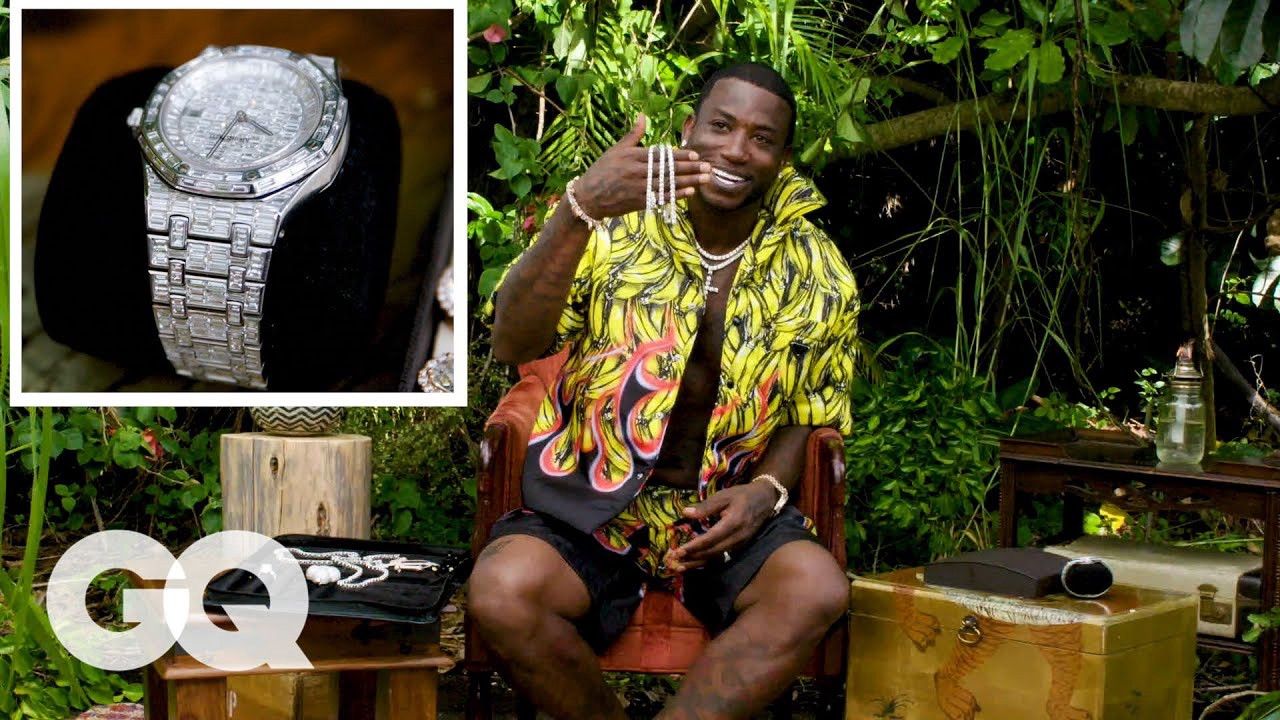
I’m always struck by how similar the lifestyles of rappers and financiers are. Same cars, same watches, same private jets. True, a financier wouldn’t bust out an Audemars Piguet (fill it with diamonds), but they’re still buying the same watch. Rappers and financiers also increasingly tell the same story — they made it by hard work, they deserve the wealth and screw everyone else. In this peak capitalist era, peak rap is the soundtrack.
Gone are the early days of hip-hop being rebellion. Rap today is the love song of the 1%.
Here are a few examples of how rap lyrics have changed, using Genius’ data set of basically every song.
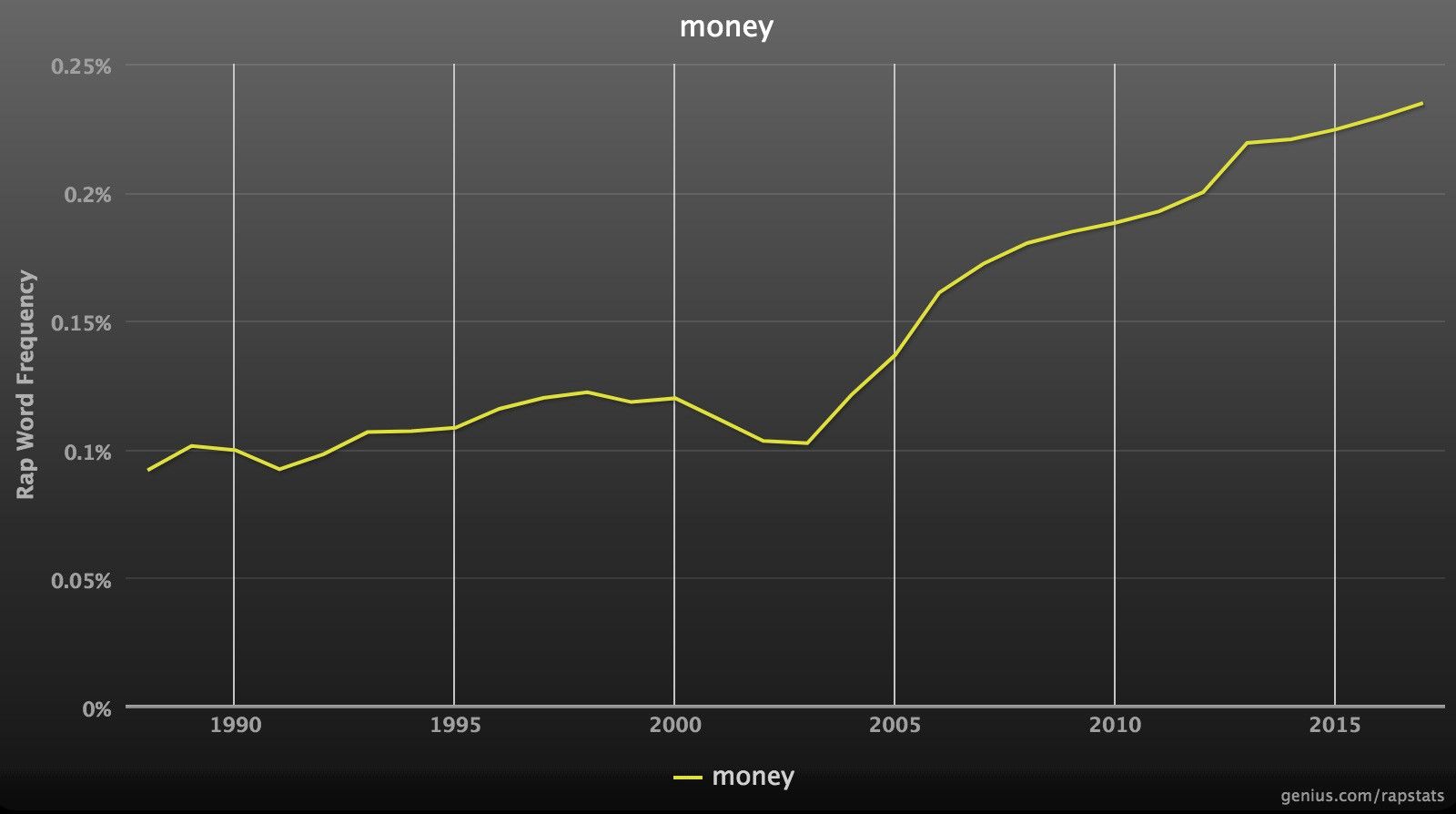
Money
The frequency of the word ‘money’ in rap lyrics has more than doubled since 2004. Of course, hip-hop has always talked about money, but at some point it became central. Displays of wealth are now vital filler to any rappers oeuvre, as essential as flowers to Monet.
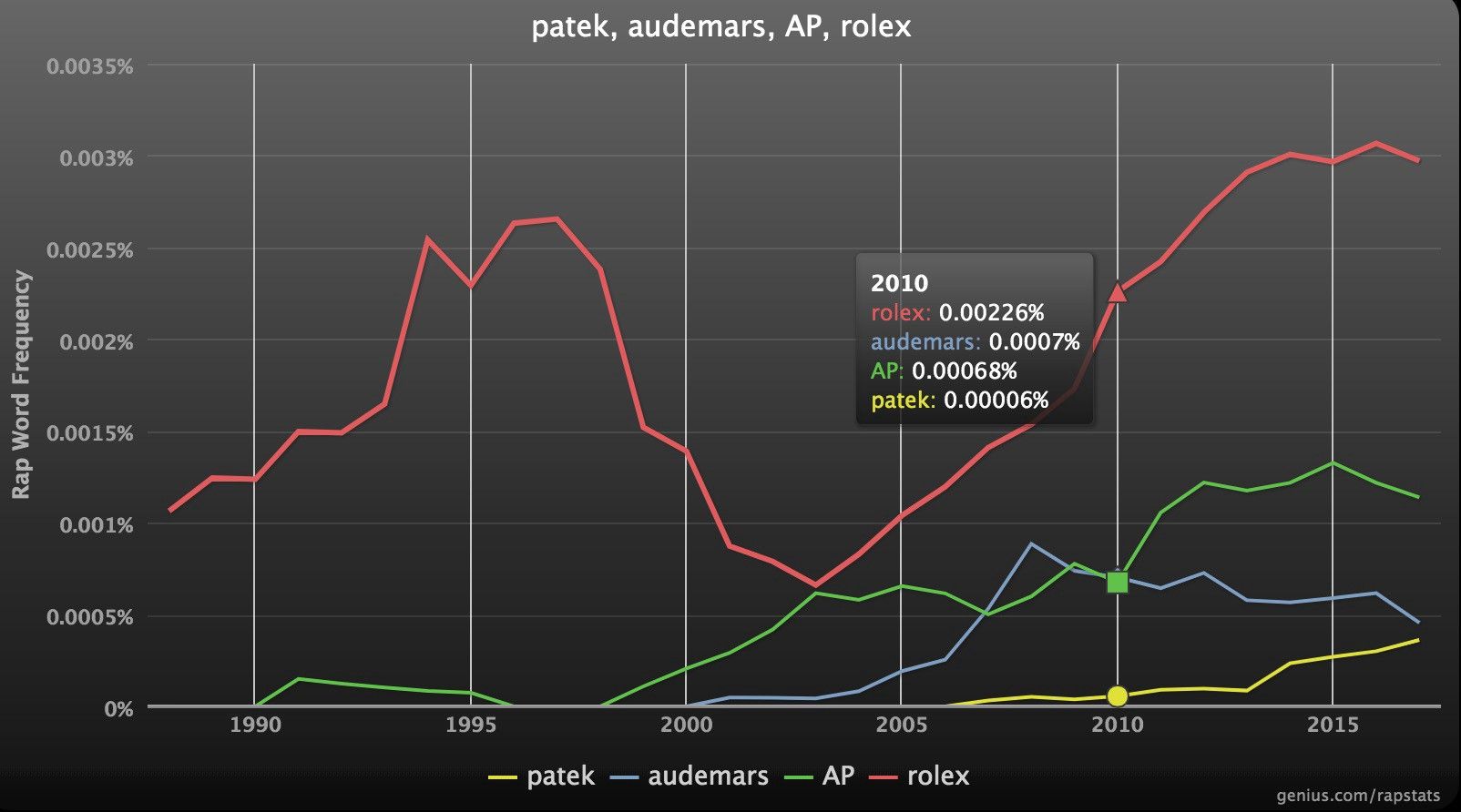
Watches
Around the same time, taste in watches evolved. Anybody that gets money knows Rolex, but around 2003/2004 rappers started to cotton on to the true watches of the 1% —lesser volume brands like Patek Philippe and Audemars Piguet.
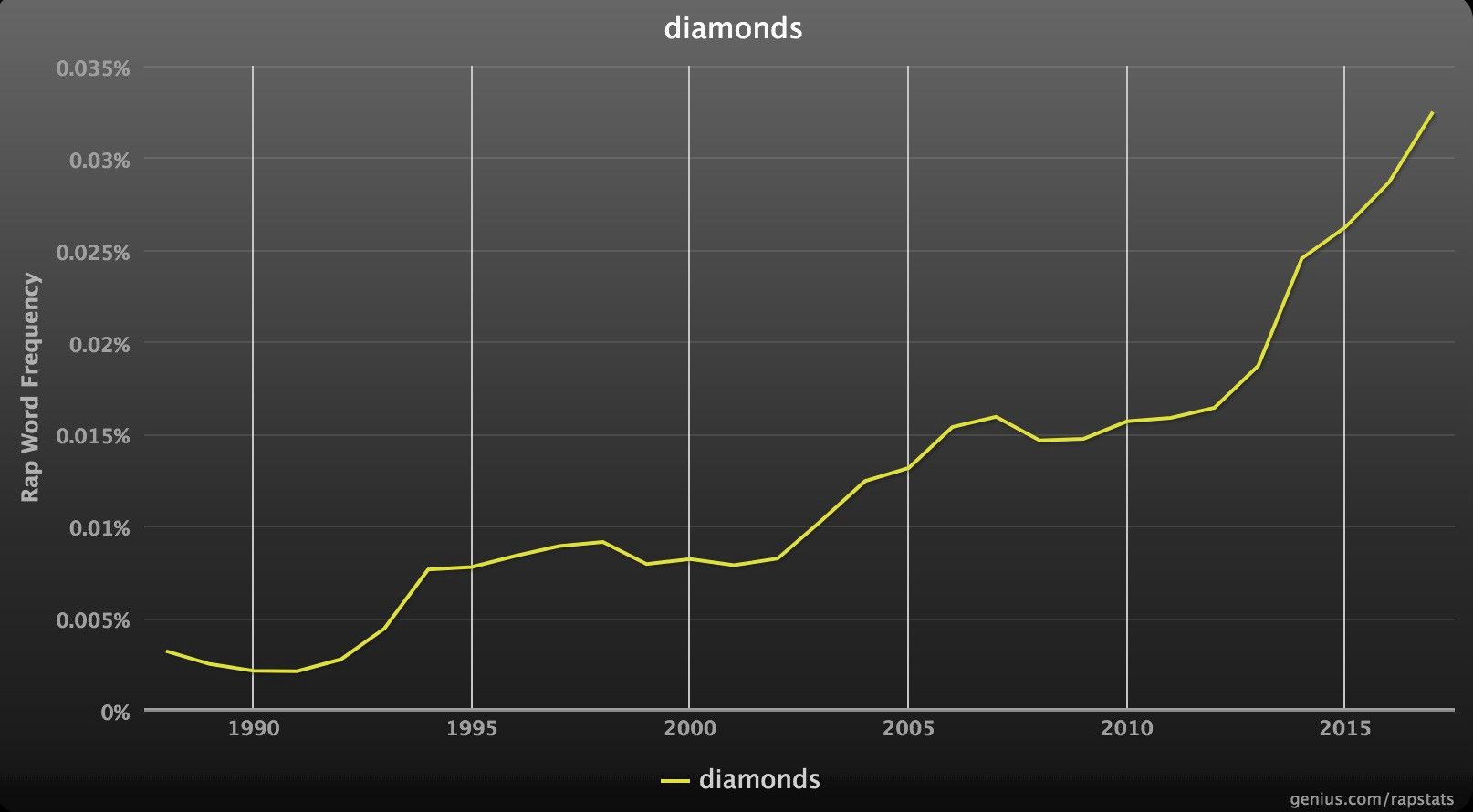
Diamonds
Finally, around the same time, rappers moved on from gold chains and diamonds became an obsession. For busting down watches or wearing as tennis chains, bracelets, cuban links. Diamonds don’t actually have much resale value, but being dripping with ice became de rigeur.
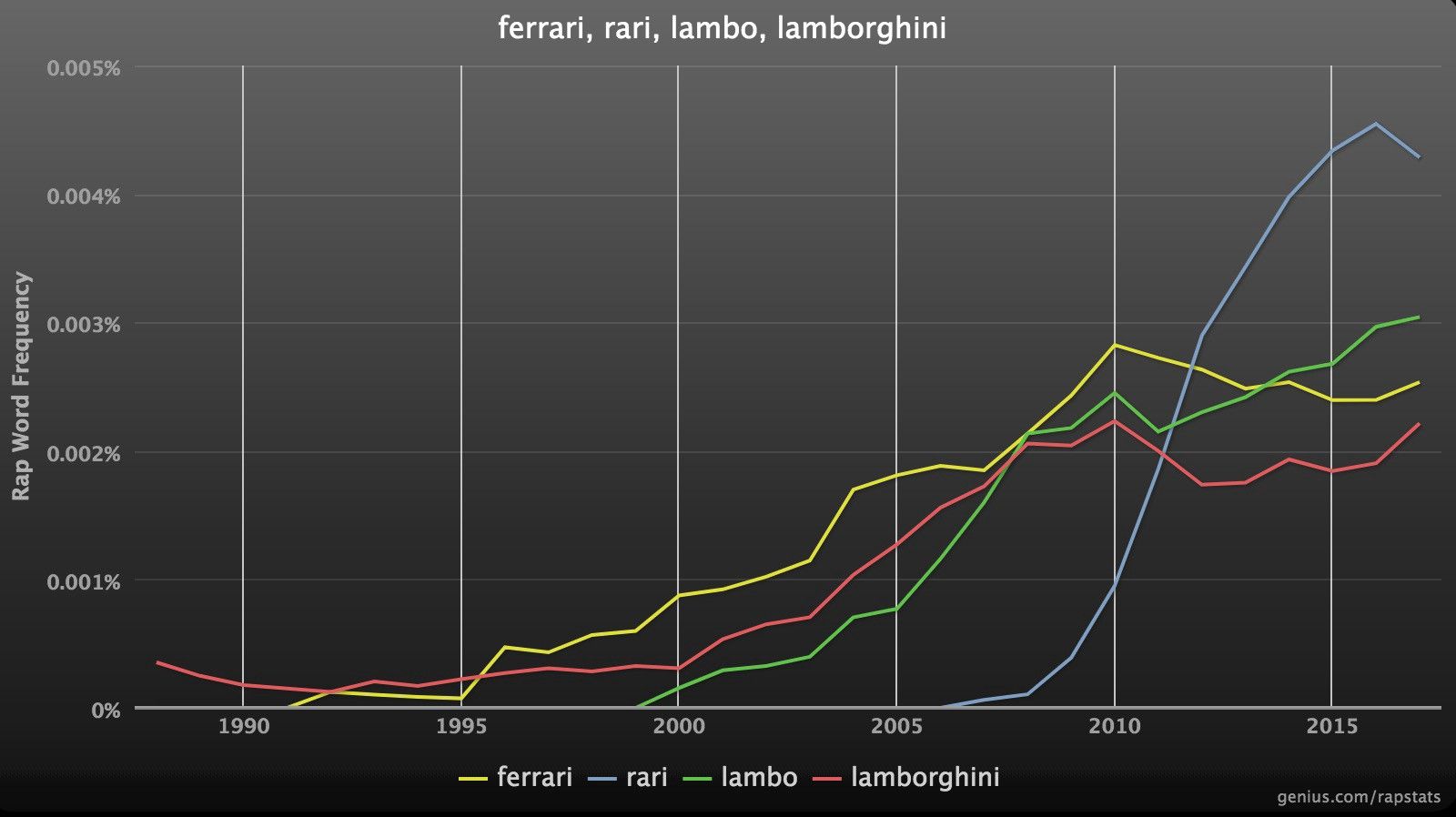
Cars
The final trend that also gathered steam in around 2004 was the transition from standard luxury cars like Beamers and Benzes to more niche supercars like Ferraris (Raris) and Lamborghinis (Lambos). Gone are the days of Wu Tang rapping about hopping out Mazda minivans. Today it’s all about hopping out coupes.
Making It
What happened was that rap made it. Rap today is pop music, having eclipsed rock and even assimilated some of the alternative music. Rap is played everywhere from the radio to kids birthday parties. Rap has also thrived in the post-CD era — releasing tons of free music and mixtapes and earning money primarily through touring, picking up tens of thousands (or millions) per show.
This is a golden age for all types of rap. In fact, ‘conscious’ hip-hop has probably never been bigger — with stars like Kendrick Lamar and J. Cole. However, the visible trend in hip hop today is wealth, as its stars become wealthy.
I listen to a lot of rap and frankly find myself getting bored of the constant stories about private jets and diamonds and money. Not bored enough that I stop listening, of course. I’m not even saying that I want rappers to talk about something else, if I did there’s actually plenty of alternative rap out there. There is also supply and demand at work here. People living in the age of equality perhaps don’t want to hear how it sucks. They want to escape and hear how they too could make it, and how enjoyable that would be.
The fact is just that this is what rap has become. As it found success, it also became the music of success. As defined by terminal and fundamentally garbage capitalism.
The Vapidity Of Wealth
Most rappers first albums are their most interesting because they are a life. From Nas’s Illmatic to Kanye West’s College Dropout, they are the product of decades. The next album is released within a few years, and in this time the rapper’s life has changed. They are richer, they travel more, hence you get more stories about wealth, fake people (especially women) and what are essentially airport brands (Prada, Gucci, etc).
While there are a few rappers that take their careers slowly, most try to make hay while the sun shines, releasing albums or mixtapes every year, or even more frequently. This, of course, limits what they’re talking about, because all they are doing is making money.
Schoolboy Q, 32, recognizes that family, community, and life outside music are heavy contributors to an artist’s craft. Without an intentional balance of social life and studio time, artists are prone to become further detached from reality, repeatedly dipping into themes of fame and luxury instead of delivering nuanced commentary (see “Black THougHts”). (DJ Booth)
This nature of the business has led to a lot of business-like music — artists with excellent flows limited stories to tell. They are working and rapping about working, and they are talking about disposable things because they are always working.
The 1%
The result of this furious hustling is music which converges more and more on the lifestyles of the 1%. Flying private, buy cars and watches, and also being assholes. More perniciously, of course, rap has started to reflect the lie of the 1%, that they somehow work harder and deserve their wealth more than, say, a single mother working two jobs to survive.
With rap, this message is even more dangerous because it’s a self-selected sample of usually black people that usually came from poverty, so it looks believable. Like, hey, if former drug dealers can make it, anyone can. But statistically, of course, this is a lie. Rappers advertise this lie, saying that the ‘started from the bottom’ or it was ‘all me’ (both Drake songs) and completely skip the social commentary on the inequality that was at least featured on debut albums.
The story that rap tells is that the people that do make it are talented and deserve it, which is basically the central lie of late-stage capitalism. It’s pernicious because the rappers that do make it are talented.
It’s still good music, but this message is evil. Which I don’t blame rappers for real, they’re just artists reflecting the world we live in. I just find it interesting that in this age of inequality, hip-hop has become the soundtrack. It’s aspirational for most fans, but there must be some financiers bumping it in their private jets being like, ‘yeah! It’s all me, all me for real!’